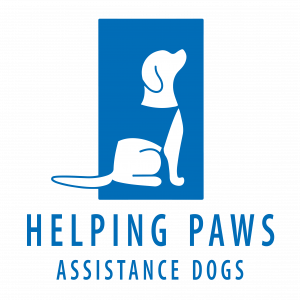Foster Home Trainers: The Gifts are a Two-Way Street
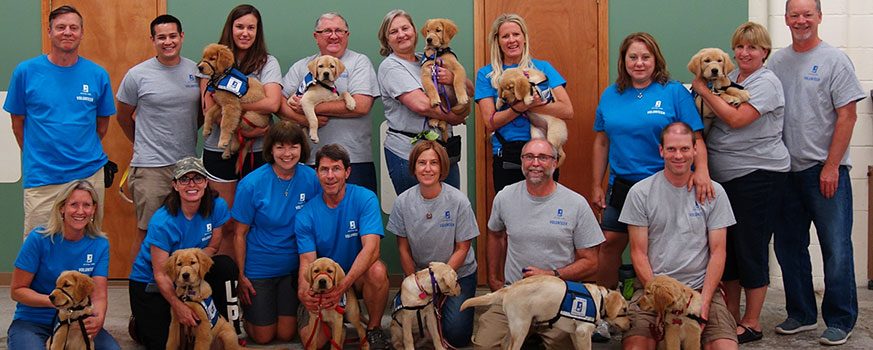
Helping Paws Foster Home Trainers are in every way its “heroes behind the scenes.” In this issue we bring three representative households front and center.
Karen and Erika Schmidt: Ella, Delta, and Laska
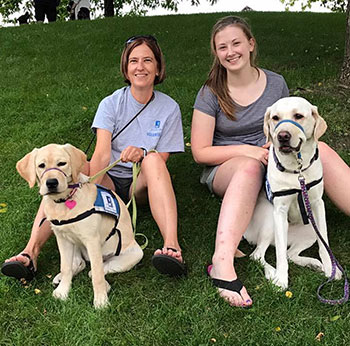
“How can you do better than starting with a puppy?” she asks. “Becoming a Foster Home Trainer has far exceeded any expectations I may have had. I mean, people come up to me and say, ‘Thanks for what you are doing,’ and it’s just so embarrassing. They don’t realize how much I gain from the opportunity.”
Karen and daughter Erika are a potent training team. They began training Ella (Sailor x Callahan) in 2013, and followed her with Delta (Chester x Callahan) in 2015. A close-knit group of Foster Home Trainers made the same choice: They all trained a “Callahan” Labrador Retriever puppy and moved right ahead as a group to train another set of “Callahan” puppies when given the chance. Karen and Erika are now training Laska (Chester x Karma) right alongside the set of friends they began with in 2013.
The three dogs from three litters clearly have an overlap in being Labrador Retrievers and sharing some genetic traits. The service of Sailor and Chester as sires for these litters was donated by Rob and Denise Babcock of The Captain’s Labradors. How is it to repeat the training process with the three dogs? “I have more than one child and I expect them to be different,” Karen says, “and each of these dogs is different too. Ella is enthusiastic and ready to go to work. It’s hard for her to chill,” she says, mentioning a specific Helping Paws cue that asks the dog to calmly wait for another task. “Delta is not as energetic. She is more relaxed and that chill factor is easy for her. Laska is a blend. She is eager, and just like most puppies chilling is not so easy. She is so smart and so clearly a problem-solver, though, and that makes her a lot of fun.”
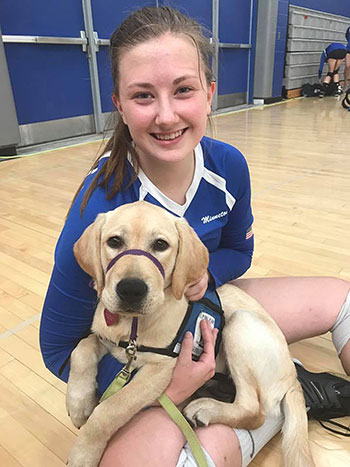
The Schmidts think training together gives the dogs a tangible advantage in one of the very first training tasks. “The puppies figure out very quickly to pay attention to whomever it is at the other end of the leash,” Karen notes. “They don’t look for cues or treats from anyone else. When we trade dogs in class with other trainers, it makes it easier on the puppy and the trainer.” Erika takes the trainer role in the weekly classes at Helping Paws and both mother and daughter train at other times.
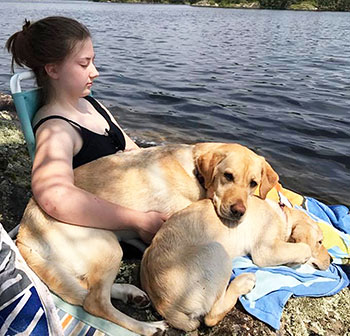
Beyond the goal of contributing to someone’s life, life-changing rewards also show up in unexpected areas. “This has always been about doing something together,” Karen offers. “What we didn’t anticipate is learning so much that we didn’t already know and building these strong and lasting friendships.”
Richard and Fran Greelis: Duncan and Morgan
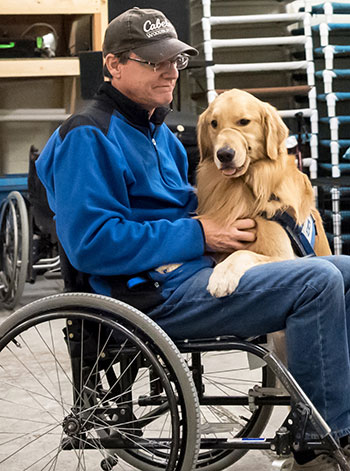
Richard and Fran Greelis hold a somewhat unique spot in the Helping Paws cadre of Foster Home Trainers. Duncan, the first Golden Retriever they trained, was donated as a puppy by breeder Beth Johnson of Summit Golden Retrievers, and was officially linked for training classes with the Do Litter of Labrador Retrievers bred by Helping Paws. Almost all other service dogs in training have been bred for their role by Helping Paws. Duncan arrived in time to be part of the celebration when the Do Litter puppies first went to their foster trainer homes, and Richard and Fran met the group they would train with weekly. The beer question arose shortly thereafter and it was an auspicious question. “I had never really been to a beer pub before,” Richard says. “Now, two years later, I think it’s up to 50 or 60.”
It turns out that visits to beer pubs offer multiple advantages to multiple parties. “When you show up with five or six service dogs in vests, you attract a lot of attention. It’s an opportunity for us to do public relations for service dogs. We pretty much decide in advance if we will let people pet the dogs. We always let kids pet at least one. And then we can educate people about why the dogs cannot be petted, that they need to concentrate and work and not be distracted by seeking to be petted.”
Now retired, Richard had previously trained police dogs as an officer for the Bloomington, Minnesota police force. He says the training process for Helping Paws service dogs is quite different from the techniques used to train police dogs but the logic behind that fits: Each kind of dog is doing a very different job. He also readily admits that the companionship of Duncan and Morgan are a big side benefit in volunteering to train them.
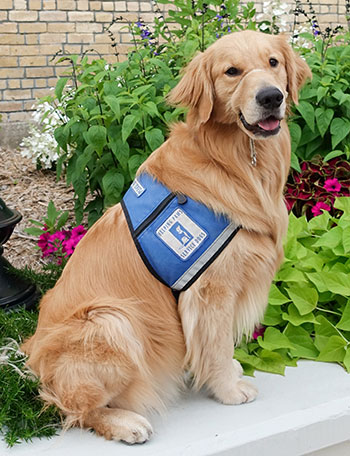
Morgan is destined to become a breeding dog for Helping Paws, a role for her that will also bring a new role for the Greelis household. “We talked to people who have done this before, as we are total rookies at having puppies,” Richard says. “We know it is a huge commitment, a lot of work, but everyone we spoke to relayed it is just the greatest experience.”
The experience of training with Duncan in public underscored Richard’s reasons for volunteering in the first place. He corresponded with Luis Carlos Montalvan, the advocate for veterans and PTSD service dogs who wrote Until Tuesday: A Wounded Warrior and the Golden Retriever Who Saved Him. He also perceived what seemed to be restrictions for people with service dogs enjoying restaurants or other public places. He and Fran volunteered to train, and with Duncan at his side, Richard says it is the questions from others that point to the nuances of what it means to need a service dog.
“People look at me with Duncan and ask if I am training him,” he says. “That seems on the surface to be an innocent question, but it really forces me to explain myself. What if I were a veteran and he was my PTSD service dog? The question has now put that veteran on the spot, forcing him or her to explain. That’s not a comfortable situation for anyone much less a veteran who is trying to heal from PTSD.”
The nuances seem at work in other situations as well, reinforcing that education and communication is a two-way street. “We go to a grocery store and Duncan can rise and place a credit card on the counter,” Richard relates. “Except that one day the cashier told me another customer had complained that it was not hygienic and they would stop shopping in that store. That had never occurred to me as an outcome.”
Richard and Fran will pass Duncan’s leash to his forever partner later this week with the full knowledge they are also passing forward the gifts brought about by two-plus years of dedicated training. They can look ahead to a different path with Morgan, knowing her path will be unique and also full of promise.
Cecilia Grass-Neary: Milton
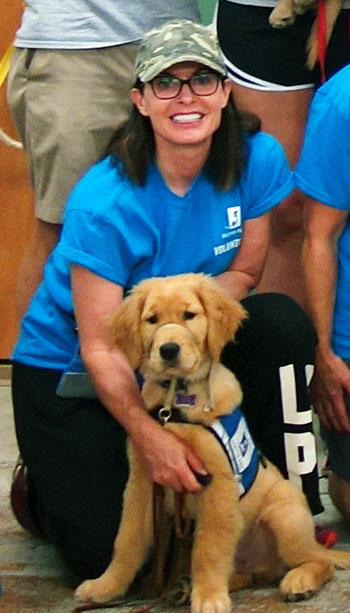
Cecilia finds some poetic justice in having Milton in her care. She has trained Golden Retrievers to compete in obedience show rings, including her dog Bogart. Bogart’s breeding is related to Milton’s through their sires.
“I know just how much dogs have brought into my life,” she says. “They offer unconditional love and can become that rock in your life, the being who provides total security in a moment.” Her own experiences prompted her to consider training for Helping Paws but she was “on the fence” about taking on the commitment of two-plus years.
“Then I attended an Open House at Helping Paws,” she says. “I met other Foster Home Trainers and I heard graduates who have service dogs talk about how their lives changed. I could see what these dogs meant to the people there.”

Cecilia is already looking ahead to Milton’s capacity to make a difference for someone she has yet to meet. “You know you are going to say goodbye to this amazing animal,” she offers, “and it’s not at all negative. The whole point is that this is a good experience for everyone.”
It may be fair to say that what Cecilia and Milton are learning together epitomizes much of what the Helping Paws service dogs offer out to the world at large. If what Cecilia can point to has occurred in only three months, what is yet to be? That unknown quantity and quality are what the Foster Home Trainers and their dogs in training are preparing for, with a new set of eyes and some puppy enthusiasm to mark the way ahead.
